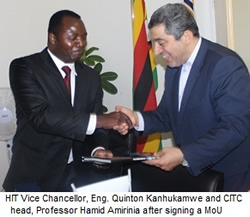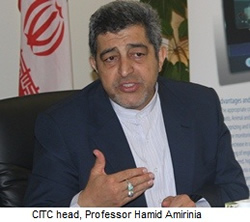
 Visiting Iranian delegation from the Centre of Innovation and Technology Co-operation (CITC) has agreed to partner the Harare Institute of Technology (HIT) in setting up facilities to produce life-prolonging drugs. This deal could help the country save millions of dollars on drug imports and offer hope to HIV-positive people in the face of critical shortages of anti-retrovirals. Head of delegation and head of the Centre for Innovation and Technology Co-operation in Iran, Prof Hamid Reza Amirinia said his country was committed to working with HIT in the manufacture of the Immuno-Modulator Drug (IMOD) drug for people living with HIV and Aids.
Visiting Iranian delegation from the Centre of Innovation and Technology Co-operation (CITC) has agreed to partner the Harare Institute of Technology (HIT) in setting up facilities to produce life-prolonging drugs. This deal could help the country save millions of dollars on drug imports and offer hope to HIV-positive people in the face of critical shortages of anti-retrovirals. Head of delegation and head of the Centre for Innovation and Technology Co-operation in Iran, Prof Hamid Reza Amirinia said his country was committed to working with HIT in the manufacture of the Immuno-Modulator Drug (IMOD) drug for people living with HIV and Aids.
IMOD is a name given to a herbal drug that, according to Iranian scientists, protects those already infected by HIV by strengthening the immune system.
"We were in conversation with the Minister of Health and Child Care, Dr (David) Parirenyatwa yesterday discussing the need to introduce IMOD drug to assist people living with HIV and Aids in Zimbabwe and be able to work with HIT in the manufacturing of the drug so that it would be readily available in Africa," he said. "We have notable achievements in the areas of medical biotechnologies in Iran and the use of the IMOD drug is among our greatest achievements."
The life prolonging drug, he said, helps stimulate the immune system and prevents patients with HIV from entering the Aids stage while also helping patients with Aids recover and experience a normal life.
"The herbal-made medication serves to rein in the AIDS virus and redouble the body's immunity. It is not a medication to completely kill the virus and can be used besides other anti-retroviral drugs." Said Prof Amirinia.
He said the IMOD drug was safe and had no proven side effects and could also be used on all diseases related to the immune system.
HIT acting vice chancellor Engineer Quinton Kanhukamwe expressed gratitude to the Iranian delegation for their commitment to this initiative saying it would help develop the country.
"We welcome this initiative since this visit is a follow up to the first visit which saw us signing an agreement to collaborate technologies from Tehran University in Iran and HIT," he said.
"We recently acquired a licence from the Ministry of Health to start the IMOD pilot project which we hope to commence soon so that if we are successful, the institute will then roll out the project on a national scale."
 Eng Kanhukamwe said the two countries would soon start an exchange programme for students from both countries to share experiences and collaborate in various research programmes.
Eng Kanhukamwe said the two countries would soon start an exchange programme for students from both countries to share experiences and collaborate in various research programmes.
"Such initiatives help us to focus on solutions to the real challenges that affect Zimbabweans," he said.
IMOD was made public in February 2007 in Iran and the drug, made from medicinal plants in 15 research centres around Iran, controls the spread of the virus in the blood stream and boosts immunity with a 90-day treatment course and a two-year follow up.
The drug took five years to develop and tests on 200 patients proved successful.
Tafadzwa Ndlovu Herald Reporterhttp://www.herald.co.zw/new-arvs-deal-for-zim/
http://www.zbc.co.zw/news-categories/top-stories/38482-iranian-delegation-meets-idcz.html